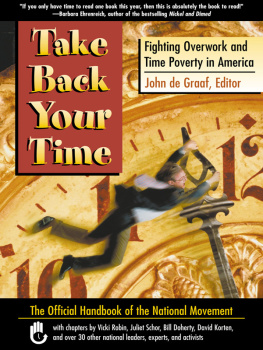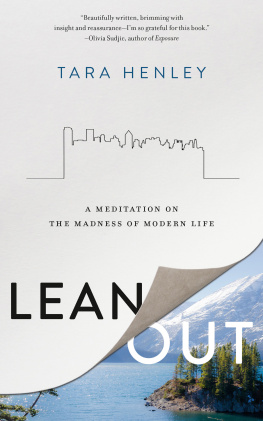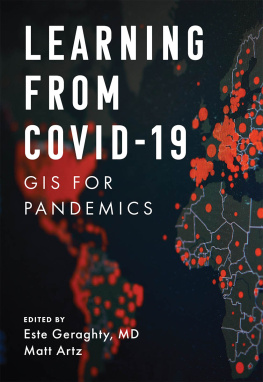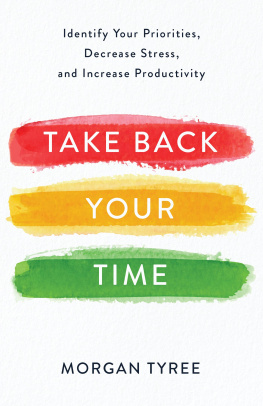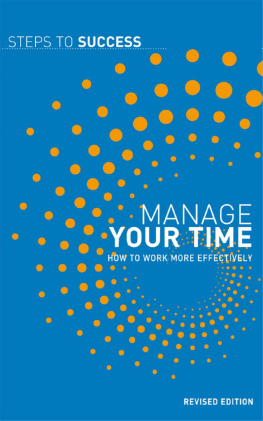Berrett-Koehler and the BK logo are registered trademarks of Berrett-Koehler Publishers, Inc.
ix

PREFACE
Take Back Your Time Day
JOHN DE GRAAF
Welcome to the official handbook for Take Back Your Time Day, a new national consciousness-raising event that will be held for the first time on October 24, 2003. The date falls nine weeks before the end of the year and symbolizes the fact that we Americans now work an average of nine full weeks more each year than do our peers in Western Europe. It wasnt supposed to be this way.
Back in the late 1960s, I studied sociology. I remember distinctly some of the class discussions we had then. We were told that American society would be facing a serious social problem by the end of the twentieth century. That problem was leisure time! With all our advances in labor saving technology, with automation and cybernation, wed be working less than 20 hours a week by the year 2000. Just what would we do with all that leisure time?
It would be a Big problem, one that we sociologists would have to help solve. As you are no doubt aware, it didnt happen. We got the technology but we didnt get the time. In fact, most Americans say their lives feel like a rat race. Millions of us are overworked, overscheduled, overwhelmed. Were just plain stressed out.
It starts at work. Despite those promises of leisure, were working harder and longer today than we were back in my college days, as several chapters in this book make clear. Americans work more than do the citizens of any other industrial country. Our work days are longer, our work weeks are longer, and our vacations are disappearing. In fact, one quarter of American workers got no vacation at all last year. Even medieval peasants worked less than we do!
x
My personal interest in this issue was re-kindled in 1993 when I coproduced a PBS documentary called Running Out of Time that explored the epidemic of overwork that seemed to be sweeping America. Then followed another documentary called Affluenza, which looked at our obsession with achieving ever-higher material standards of living at the expense of other values we once held dear. Working on those programs allowed me to meet many people who were trying to find more balanced lives amid the pressure to work and spend, amid the constant barrage of messages urging all of us to work and buy more and more and more and
These were people who were beginning to ask big questions, and the biggest of them was: what is an economy for? Why for the sake of the economy were we caught up in patterns of life that force us to pay an enormous price in terms of our health, our families and communities, and the earth itself, and that, in fact, leave us less happy than we were decades ago when we had half as much stuff or less?
About two years ago, I was invited by Vicki Robin, one of the authors of this book, to join an organization called the Simplicity Forum, made up of recognized leaders of the voluntary simplicity movement. I ended up as the co-chairperson of the Forums Public Policy Committee. The Committee was formed because all of us had become aware that simplifying our lives wasnt a purely personal choice.
We knew that for millions of Americans simplicity was anything but voluntary. We knew that the rising cost of key necessities (such as housing and health care) in America kept many people struggling to make ends meet. We knew that sprawl, well-meaning but misguided zoning laws, and poor public transportation made it difficult for us to reduce the amount of driving we did, despite our concerns about energy use, the Arctic National Wildlife Refuge, or global warming.
As we talked about what we might do to help create a more simplicity-friendly society with more balanced, healthy and sustainable lifestyles, it became clear that we couldnt just stand against overconsuming. We needed to be for something, something that was clearly missing in our society despite all its material wealth. Most of our committee felt that something was time.
Many of us were overworked ourselves and constantly rushed. Others saw the phenomenon among our friends; every time we wanted to get together with them theyd have to take out their calendars and look weeks ahead for a little white space amid work and scheduled appointments.
We also talked about our lives outside of work, about how time-pressured and overscheduled even our childrens lives had become, despite warnings from prominent child psychologists that kids need time just to be kids. We were shocked to learn that many school districts had even eliminated recess in a misguided effort to make their students more productive.
As we shared experiences and further researched the issue, we came to understand that overwork, overscheduling, and time poverty threaten our health, ourxi marriages, families and friendships, our community and civic life, our environment, and even our security. I promise that youll see what we mean as you read through this book.

